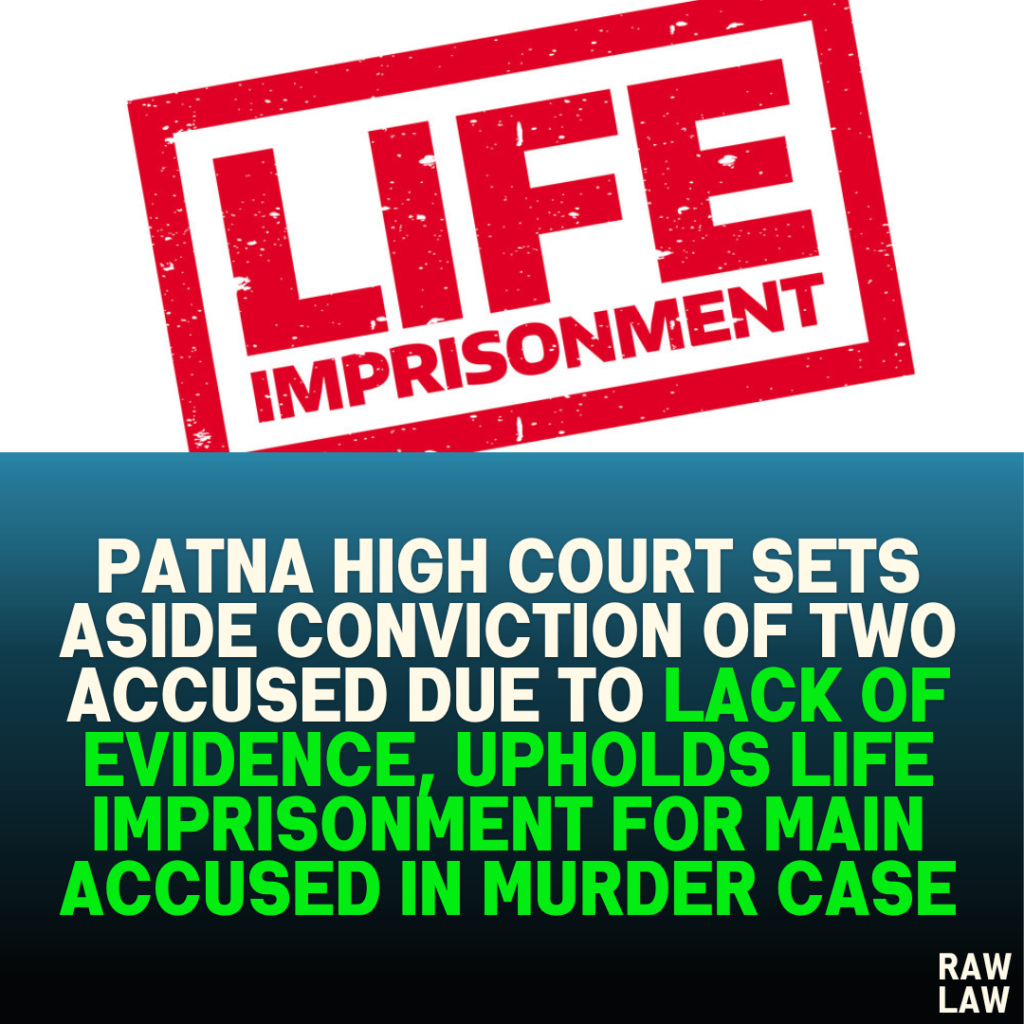Court’s Decision:
The Patna High Court upheld the conviction and life imprisonment of the main accused, while acquitting the other two accused due to lack of evidence. The court found that the conviction of the two acquitted accused was not substantiated by any direct evidence, whereas the main accused’s role in the crime was established beyond reasonable doubt.
Facts:
The incident arose from a dispute regarding attending calls of nature, during which the accused and others allegedly assaulted the victim. The victim’s daughters, who were eyewitnesses, reported that their father was attacked with a knife, causing fatal injuries. An FIR was registered on the same day, and the appellants, along with another accused, were named in the case. The investigation led to the charge-sheeting of all three appellants for murder and wrongful restraint under the Indian Penal Code.
Issues:
- Whether the evidence presented was sufficient to prove the guilt of all three appellants beyond reasonable doubt?
- Whether the testimonies of relatives of the deceased could be relied upon in the absence of independent witnesses?
Petitioner’s Arguments:
The counsel for the appellants contended that:
- The prosecution’s case relied heavily on the testimonies of family members, which should be treated with caution.
- There were significant contradictions in the witness statements.
- None of the independent witnesses corroborated the prosecution’s version.
- The main appellant had inflicted a single injury, and there was no direct involvement of the other two appellants in the actual assault.
Respondent’s Arguments:
The prosecution argued that:
- The testimony of the daughters was consistent and supported by medical evidence.
- The absence of independent witnesses does not dilute the prosecution’s case.
- The presence of all three appellants at the crime scene was established, and they actively participated in the crime.
- Minor contradictions in the testimonies are natural and do not impact the overall prosecution case.
Analysis of the Law:
The court referred to multiple precedents, stating that the testimony of family members could not be discarded solely based on their relationship with the victim if found credible and consistent. The court reiterated that minor contradictions do not vitiate the prosecution’s case if the overall narrative is plausible.
Precedent Analysis:
The court relied on judgments like:
- Yogesh Singh v. Mahabeer Singh, where it was held that family members’ testimony could be relied upon if supported by other evidence.
- State of U.P. v. Kishanpal, where the Supreme Court noted that the presence of contradictions does not necessarily discredit a witness.
Court’s Reasoning:
The court found that the testimonies of the victim’s daughters were consistent and credible. The postmortem report corroborated their statements, establishing that the fatal injury was caused by a sharp object. The main accused’s involvement was directly linked to the crime through the evidence on record. However, there was no independent evidence to show that the other two appellants actively participated in the murder.
Conclusion:
The Patna High Court upheld the conviction of the main accused for life imprisonment under Section 302 IPC but acquitted the other two accused, giving them the benefit of the doubt due to lack of direct involvement.
Implications:
The judgment reiterates that familial testimonies, if credible, can form the basis for conviction. It also emphasizes the need for the prosecution to establish the active role of each accused beyond reasonable doubt to sustain a conviction under serious charges like murder.




Pingback: Supreme Court Clarifies Interplay Between Reassessment Provisions Under Income Tax Act and the Relaxation Provisions of TOLA: Impact of Finance Act, 2021 - Raw Law